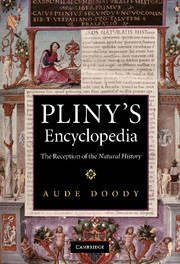Book contents
- Frontmatter
- Contents
- Acknowledgements
- Note on the text
- Introduction: how to read an encyclopedia
- 1 Science and encyclopedism: the originality of the Natural History
- 2 Diderot's Pliny and the politics of the encyclopedia
- 3 Finding facts: the summarium in the early printed editions
- 4 Specialist readings: art and medicine from the Natural History
- Conclusion: changing approaches to Pliny's Natural History
- Bibliography
- Index
- References
Introduction: how to read an encyclopedia
Published online by Cambridge University Press: 04 May 2010
- Frontmatter
- Contents
- Acknowledgements
- Note on the text
- Introduction: how to read an encyclopedia
- 1 Science and encyclopedism: the originality of the Natural History
- 2 Diderot's Pliny and the politics of the encyclopedia
- 3 Finding facts: the summarium in the early printed editions
- 4 Specialist readings: art and medicine from the Natural History
- Conclusion: changing approaches to Pliny's Natural History
- Bibliography
- Index
- References
Summary
If Pliny the Elder is famous for anything, it is probably for going too close to a volcano. Not just any volcano, the celebrity of Vesuvius has lent a kind of glamour to the story of Pliny's death, as it was told by one famous writer to another, in a tantalising moment of literary exchange between Pliny the Younger and Tacitus (Ep. 6.16). For later readers, the mode of his death could make Pliny an icon of scientific endeavour: on his deathbed, Francis Bacon, blaming dangerous experiments rather than too much opium for his final illness, finds a precursor in Pliny; for the radical encyclopedists of eighteenth-century Paris, Pliny's death made him a martyr for rational science in the face of ignorance and superstition. It is a romantic image, one that oddly coexists with the sometimes dismissive, sometimes indulgent, criticism that nineteenth- and twentieth-century scholarship lavished on his one surviving work. The Historia Naturalis, or Natural History as I will call it, is less often read than the letters of the more popular Pliny, but it continues to be used as an indispensable source by historians of the ancient world. There is little in the way of romance about the Natural History. Its catalogues of dry facts, studded with fantastic stories, build a monumental account of the nature of things, always threatening to flatten the reader under the weight of its knowledge. For this, and more complex reasons, it is usually called an encyclopedia.
- Type
- Chapter
- Information
- Pliny's EncyclopediaThe Reception of the Natural History, pp. 1 - 10Publisher: Cambridge University PressPrint publication year: 2010



